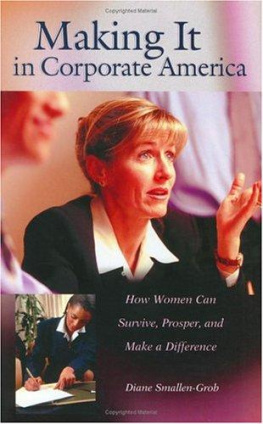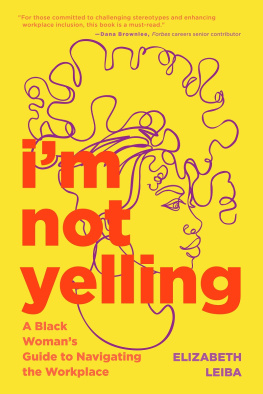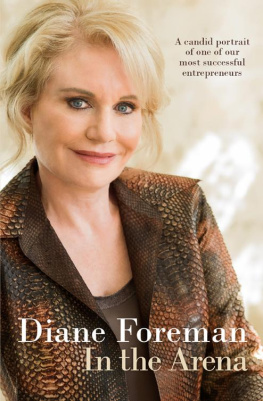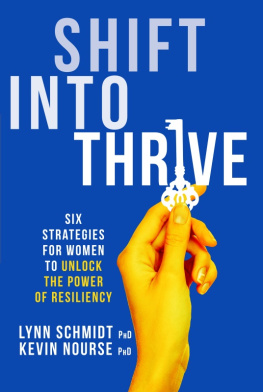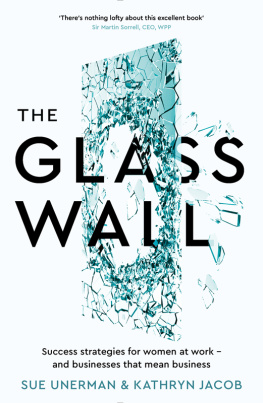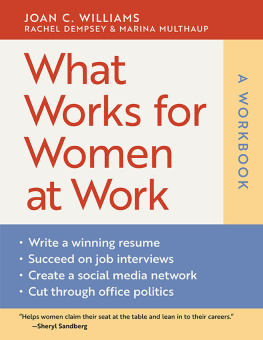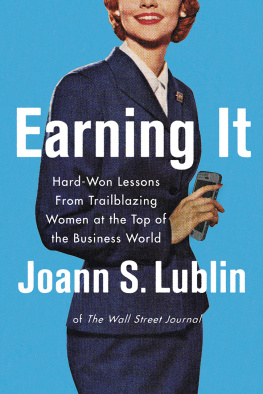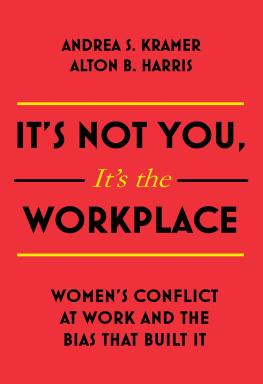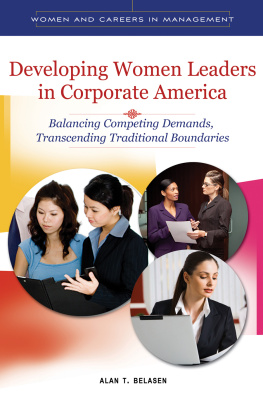Making it in Corporate AmericaHow Women Can Survive, Prosper, and Make a Difference
Diane Smallen-Grob
Westport , Connecticut London
Library of Congress Cataloging-in-Publication Data
Smallen-Grob, Diane. Making it in corporate America: how women can survive, prosper, and make adifference / Diane Smallen-Grob. p. cm. Includes bibliographical references and index.
ISBN 0-275-98110-X
1. Women executivesUnited States. I. Title.
HD6054.4.U6S6 2003
658.4'09'082dc21 2003048206
British Library Cataloguing in Publication Data is available.
Copyright 2003 by Diane Smallen-Grob
All rights reserved. No portion of this book may be reproduced, by any process or technique, without the express written consent of the publisher.
Library of Congress Catalog Card Number: 2003048206
ISBN: 0-275-98110-X
First published in 2003
Praeger Publishers, 88 Post Road West, Westport, CT 06881 An imprint of Greenwood Publishing Group, Inc. www.praeger.com
Printed in the United States of America

The paper used in this book complies with the Permanent Paper Standard issued by the National Information Standards Organization (Z39.48-1984).
10 9 8 7 6 5 4 3 2 1
To Werner, with whom nothing is impossible.
ACKNOWLEDGMENTS
I couldn't walk away from years in business and leave all the unanswered questions asked by my youngest and most promising starlets. Therefore, I thank Stephanie Hoeckle and Monica Goldstein for asking me to tell them what they needed to know and for hoping I could give them all the answers. This book is written for them. I am indebted to my husband for being my light, my spirit, and my support and to Karen Gottlieb for reading the manuscript, to Peggy Hutson and Marie Ellen Larcada for having faith in me. I shelved this book after September 11, 2001, thinking women and corporations were so meaningless during that time of tragedy. It all seemed irrelevant. But the world came back and with it all the same issues, including women's place in the executive suite.
I could not have even conceived writing this book without the help of all the wonderful women I interviewed. For those named and those who preferred to remain anonymous I am eternally grateful. They gave me their time and candor. I am honored to have met them all and to be able to pass on their magnificent advice to younger generations. I thank all the people who cheered me on and introduced me to the women I had never met before, especially Lois Oppenheim and Penelope Dixon.
Most of all, I hope this is the last book that ever has to be written on this subject.
About the Author
DIANE SMALLEN-GROB is a full-time writer.
Introduction: First Steps
Tell me and I forget. Show me and I remember. Involve me and I understand.
Chinese Proverb
To date, the best advice about making it as a woman in a man's world comes from Eleanor Roosevelt, probably the greatest role model for all of us. Although her remarks were targeted at surviving public life in Washington, D.C., these words apply to any woman leaving the sanctity of her home to make it in a bigger place, wherever and whatever that place may be. In her words:
You cannot take anything personally.
You cannot bear grudges.
You must finish the day's work when the day's work is done.
You cannot get discouraged too easily.
You have to take defeat over and over again and pick up and go on.
Be sure of your facts.
Argue the other side with a friend until you have found the answer to every point which might be brought up against you.
Women who are willing to be leaders must stand out and be shot at. More and more they are going to do it, and more and more they should do it.
Every woman in public life needs to develop skin as tough as rhinoceros hide. []
Eleanor Roosevelt's advice is unassailable. Making it in the business world is not rocket science. We couldn't do much better than her nine suggestions even if we combine all the how-to books, all the advice, all the magazine articles written for us. Just as there are millions being made writing diet books, there are hundreds of books giving us five ways to win at a man's game. And just as losing weight does not become easier if we spend more money on tapes, books, and magic potions, reading books on adopting male stratagems won't open the doors to the boardroom for women. Succeeding as a woman in business follows a simple recipe, seasoned with some serendipity.
Fundamentally, we face only a few scenarios in the workplace. How we react to them shouldn't change all that much over time. We have learned a tremendous amount about the skills and behavior necessary to get the next promotion. Fortunately, the men we work with have learned a lot, too, and are getting used to seeing us in the office next door. Perhaps they learned to accept women in the work world under duress, perhaps it was legislated at company headquarters, or perhaps mothers, wives, sisters, or daughters brought them up well. The good news is that more men are sensitive and aware now than ever before.
Is this the end of the story? Have women come the long way we have been convinced we have? Well, yes and no. For sure, many more of us are working, and working in more senior positions. As it should be. But the percentages at the top are still unimpressive.
Where are we, the first generation, the women early baby boomers (WEBBs) now, thirty to thirty-five years after graduating from college? Given our age, experience, and education, we should be right up there on the executive floors of corporate America. Were it so, there might be fewer scandals and richer shareholders.
Plenty of solid statistics that we all need to know are shared in this book. But more important, we women in corporations have our own stories, the real-life experiences we have endured and used to toughen our hides. Perhaps these stories can provide what a role model would as you work your way through the corporate maze. I learned a lot researching and writing this book. I only wish I had known then what I have learned now.
For all the advice books written on success, on making it as women in a man's world, or on getting power, there are more real stories by women in top positions who did it their way. Their way worked quite well. And although all the women with whom I spoke took different paths to their success, they shared similar personality traits, similar luck, but most important, they all demonstrated confidence in making the choices they made.
Men have it easier. Maybe not as interesting, but easier. They don't have to make life changing choices at every step. From the start, most men get on a course that veers very little. Few men choose middle management as a goal, even if that is as far as they get.
Some days there is a convergence of so much information that it forces you to reflect about the worth of our achievements. Besides Catalyst, the "nonprofit research and advisory organization working to advance women in business," dozens of think tanks are studying women in the workforce. Each study approaches our situation from a new angle. They look at why we get ahead and why we don't get ahead. The most compelling and disquieting concern, however, is that we women do serious harm to ourselves perhaps more than men have done. Call it the "betrayal of women," "women vs. women," whatever. It is serious, it is powerful, and it is the one reason we refight the same battles for centuries. Men may use their sheer physical power and strength to defeat us, but we inflict mental warfare on ourselves. Either way, we end up losing.

